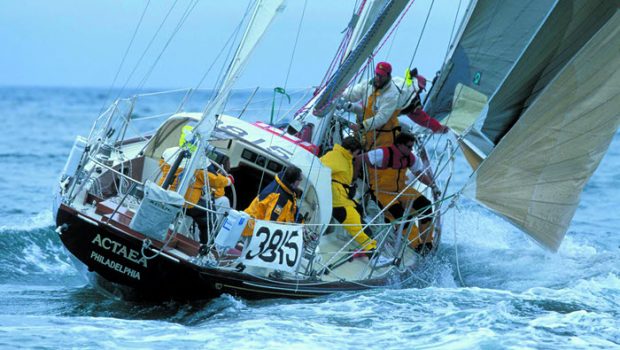Managing yourself offshore
Published on June 15th, 2022
The sport of sailing embraces adventure, but let’s face it, a diet of only windward-leeward regattas isn’t too adventuresome. To unplug and become immersed, long distance racing is required. Professional sailor and coach Chris Snow provides guidance on heading for the horizon:
Offshore sailing presents a whole different set of challenges from inshore racing. There are the navigation and safety challenges, organizing specialized sails, food, onboard systems, and all the rest. One thing that also requires consideration is how you manage yourself and your personal gear.
Being on a boat with others for an extended period of time takes us out of our warm, cozy lives on shore and subjects us physically and mentally to a whole new and somewhat harsh environment. We are in close quarters with others 24/7, often sleep deprived, and out in the elements for extended periods of time. It can be downright uncomfortable. It can also be incredibly exhilarating and rewarding.
The interior of an offshore racing boat is often pretty spartan but there are some steps you can take to make yourself more comfortable. If it’s been some time since you’ve sailed offshore, or it’s new to you, here are some things I have learned that can help you enjoy the experience more and help make you a more effective member of your team.
• Keep track of your #$%^. It’s amazing how easy it is to lose things in the small space of an offshore racing boat. Have a place for all your personal items and keep them there. Get religion about it. I wear prescription glasses. I need them to see the instruments at night. I bring a spare pair that I’ll keep hidden away but I always put the ones I am using away carefully in the exact same place when I am not wearing them. The same needs to hold true for all your other stuff from your safety harness to your foul weather gear. When you are tired and not thinking clearly knowing for sure where your sailing gloves are makes life that much simpler.
• Do not scrimp on foul weather gear. Weather offshore is unpredictable. There is nothing worse than being cold and wet for an extended period. Good foul weather gear is expensive but 100% worth it when the weather turns nasty.
• Have a watch system, even for shorter races. Offshore races are won by the boats that sail as close to 100% all the time, night and day. You can’t race 100% if you are exhausted. Even for races less than 24 hours, set a simple watch system and stick to it. Your team performance will be better.
• Don’t be late for your watch. There is nothing worse than being on deck at 2 AM at the watch change and waiting for the new watch to come on deck. When you tuck into your bunk and go off watch set your phone or watch to wake you so you have time to get your gear on and be 10 minutes early for the watch change. This sends a positive message to the rest of the team too. If you are using a staggered watch (the whole watch does not change at once) system getting yourself up is a must. Try identifying one person of the team to wake up by just their feet in the middle of the night!
• Offer to make a (hot) drink for the oncoming watch. In the same vein as not being late, when you are going off watch, offer to whip up some coffees or whatever is appropriate for the oncoming watch. It is always very appreciated!
• Wear your life jacket/safety harness whenever YOU feel like it. Many offshore races have a requirement that lifejackets be worn at all time on deck at night. You should wear your lifejacket whenever you feel like it. You should also clip in whenever you feel like it and always at night when the breeze is up at all. If the leader of the crew is not setting a good example here you are clearly on the wrong boat.
• Respect the head. The toilet is a very vital piece of equipment on an offshore boat. Make sure you know how to use and ask if you don’t. There is probably no faster way to alienate yourself from the team than breaking the head because you did not know how to use it. Besides you will likely have to fix it yourself.
• Speaking of heads, sleep feet forward. It’s an unfortunate reality that there is more stuff in the ocean to run into than ever, the most dangerous being shipping containers that have fallen off ships. At last report, more than 1500 fall off each year. Hit one of those at full speed and you are going to get shot forward, quickly. Protect your noggin by always sleeping feet forward.
• Try to get as much quality sleep and rest as you can. Sleeping on a pitching, loud, wet boat is a challenge, on longer races it actually becomes easier as your sleep deficit builds up and you get into the rhythm of the watch system. Here are few things I have found that help:
» If possible, remove foulies and boots/shoes before getting into your bunk. Sleeping with your foulies off will allow any moisture on your skin to evaporate. If you are wearing synthetic long underwear (you should be) this help to really wick the moisture off your body.
» Try to sleep with a blanket or sleeping bag on top of you. Most boats will provide something to cover yourself when in your bunk. Use it, as it more closely mimics sleeping at home. It can be cold and damp offshore especially at night.
» Use a pillow. If the boat has pillows for the bunks use them. A little extra padding for the head helps you snuggle in. Or use one of the layers of clothing you have taken off.
» Wear earplugs or airpods. Check with the skipper first for safety reasons. Sleeping right under a loud active winch makes sleeping a lot harder than at home. Wearing earplugs or playing some familiar music on airpods can make it easier to drift off.
» Avoid caffeine. Most watches are 4 hours at longest. That is not enough time for the caffeine in a coffee to exit your system. If you are a coffee drinker on shore, like me, the best is to wean yourself off the stuff before the race (easier said than done).
• If you don’t understand your role in a maneuver–ask. Pride is a tricky thing and can keep us from asking the right questions. If you are new to a boat or the team has not practiced much, maneuvers can go bad quickly at all times (especially when you are tired and at night) if everyone does not understand their job. The extra time it takes to ask a question and get everyone on the same page is well worth it compared to wrapping the kite around the head stay or something similar.
Hopefully, these tips will help you enjoy your next offshore adventure more Any thoughts or comments to add are welcome in the comments section below. Good sailing. Comments welcome!









 We’ll keep your information safe.
We’ll keep your information safe.